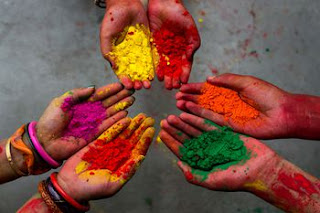I don’t even remember
how many years of holi left me
untouched unsmeared by colours.
I don’t know how it feels when
a loved one sprinkles and smears
the rainbow colours of love:
was it your mellifluous voice
or the magical touch that winged
my
feelings to fly away outpacing
the speed of the wind to your
paradise of fresh
colours of love?
I sauntered the market looking for
colours unearthly to match you,
looked for the exotic but in vain
nothing pleased me:
I returned with slow heavy steps.
Will this year too the holi would betray
my eager heart and curious soul
empty handed I stood before him
to find in dismay his coloured face
no place was left for me,
but no worry
I had my ways and my dreams
to colour him,
I stepped forward and hugged him
so tight the colours fell off.
I painted his soul with my lips
the long liplock covered the lost years.
How better my holi could have been!!
Sabita sahu
Sabita sahu










